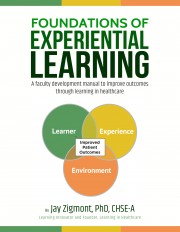
Experiential learning has been proven to cause improvement in healthcare outcomes including a >35% reduction in RN orientation, 10% reduction in infant mortality, 12% increase in HCAHPS, and a positive impact on all areas of the Healthcare Balanced Scorecard. To help health systems embrace experiential learning, Learning in Healthcare has launched a new book "Foundations of Experiential Learning" to provide a faculty development manual for improving outcomes through learning in healthcare.
West Haven, CT, March 15, 2016 (Newswire.com) - Learning in Healthcare is proud to announce the launch of its first book entitled "Foundations of Experiential Learning - A faculty development manual for improving outcomes through learning in healthcare". Now available on Amazon at http://FEL.LearninginHealthcare.com in both print and Kindle editions.
The Foundations of Experiential Learning (FEL) Faculty Development Manual is designed to provide quick reference content (Learning Cards), frameworks for discussion and review (Reflections) and entire faculty development courses (Appendices). The intent is for the manual to follow the experiential learning cycle (Do, Reflect, Think, Re-Do, Learning Card 3). Depending on your learning style (Learning Card 3a), you may find the cards as a practical review (Think), the reflections and video as a reflective tool (Reflect), and the application experience as a way to ‘try out’ the content (Do or Re-Do).
All learning is experiential. We need to embrace experiential learning in healthcare (both simulated and real experiences) to improve patient outcomes
Jay Zigmont, PhD, CHSE-A, Learning Innovator/Founder
The Foundations of Experiential Learning Manual is divided into three sections:
- Learning Cards – practical 1-page concepts that can be utilized and taught on their own, or in concert with other topics. Each page includes a concept on the front, and content for ‘Diving Deeper', ‘What to Watch For', ‘Connections' and ‘References'. Each card is numbered in the top right corner and referred to as Learning Card # or L-#. For more on each card see the reflections and associated videos.
- Learning Card Reflections – content to help facilitate reflection and discussion (about 1-2 hours in length) about each card. Based on content from Learning in Healthcare, the reflections also include links to videos about each card taught by Jay Zigmont, Ph.D., CHSE-A and additional application experiences. To provide a quick hour overview, share a card, its reflection and show the associated video to your group (possibly followed by a debriefing). After completing the video, use the application exercise followed by a quick debrief to allow learners to apply what they learned.
- Appendix – includes example faculty development programs based upon the learning cards. There are four example courses (similar in content) that are targeted for general purpose (Appendix A), nursing orientation (Appendix B, intended to be utilized with the Manual for Optimizing RN Orientation), preceptor training (Appendix C), and grand rounds/ongoing (Appendix D). Each card and reflection exercise is intended to be about an hour.
The entire manual is based upon 5 Principles of Learning in Healthcare:
· Everything is about our patient(s)
· Education ≠ learning
· Learning = changed outcomes
· Learning is an expertise (that should be consulted by content experts)
· Everyone is in learning
The Learning Cards and content within this manual are one component of the Leadership Playbook for Healthcare, which integrates four critical skills for being a leader in healthcare: Trust, Change, Teamwork and Learning. Our belief is that a leader has to both lead and follow in all four areas. For the section on Learning, that means that leaders need to both be able to be active learners from their experience, and to help others learn. We have focused on learning from experience, as it is essential in healthcare if we are going to have high learning organizations that continuously improve patient outcomes.
The manual is designed to work both as a whole or to allow you to pick and choose the specific concepts that will help you. You can learn the content on your own by reading the cards and reflections, in addition to watching the videos, or as part of a larger course/initiative. Everything in this manual is aimed at achieving measurable outcomes from learning in healthcare. For more information about how to improve outcomes from learning (including hosting faculty development courses and consulting at your location), please visit http://www.learninginhealthcare.com or email jay.zigmont@gmail.com .
You are free to use the content within this manual within your faculty development courses. If you are going to be using more than just excerpts (10% or more), please purchase a copy of the manual (http://fel.learninginhealthcare.com) or learning cards (http://learningcards.learninginhealthcare.com) for each participant. Licensing agreements and bulk purchases can be arranged, including purchase via purchase order. For more information email jay.zigmont@gmail.com
About the author of Foundations of Experiential Learning - Jay Zigmont, PhD, CHSE-A. Dr. Zigmont, is the Founder of Learning in Healthcare and the author of the 3D Model of Debriefing and the Learning Outcomes Model. Jay’s work has been proven to cause a >35% reduction in RN orientation, 10% reduction in infant mortality, 12% increase in HCAHPS, and a positive impact on all areas of the Healthcare Balanced Scorecard. Dr. Zigmont received his PhD in Adult Learning (focused on Experiential Learning) from the University of Connecticut and is clinically trained as a Paramedic. He has served for the past three years as the chair of the CHSE Prep Subcommittee for SSIH and has presented and published nationally and internationally.
Share:
